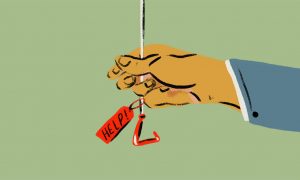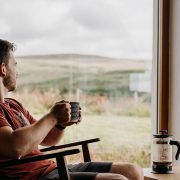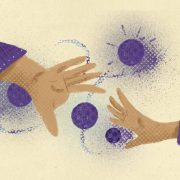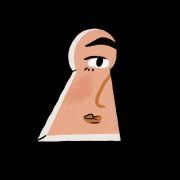I’m a Counsellor, and I Struggled with Anxiety
Written by Adiemus Seah, Australia
Adiemus (BBSC, BACC, MGPC, MAPP) is passionate about helping people achieve goals and enhance wellbeing. He is the founder and director of Strengths Optimizer, and has worked as a registered counsellor, certified strengths coach, and accredited mental health first aid instructor for twenty years. He is the host and producer of the YouTube series, Science UP Your Wellbeing, where he interviews experts in wellbeing science and shares nuggets of wisdom on helping people flourish. He currently lives in Melbourne.
“I’m sorry, there is no cure for your medical condition.” Those were the last words I expected to hear from my doctor. I was 28 then.
“But the good news is you can manage the symptoms through medications. Because you have a chronic disease, you need to take medicines every day, for as long as you are experiencing the symptoms,” he said.
The doctor went on to list the food I couldn’t eat—no deep-fried food and nothing acidic. The food that I could eat sounded bland and tasteless; if it wasn’t steamed veggies, it was steamed fish. He also told me to avoid doing stressful things (as if it was something that could be easily avoided).
The diagnosis left me shocked, confused, and furious.
I had always considered myself a healthy person
You see, I had always considered myself to be fit and healthy. I exercised regularly, ate a balanced diet, and neither smoked nor drank.
But one day, out of the blue, I started experiencing severe nausea and vomiting. Initially, I wasn’t too concerned about it and I put it down to some bugs in my stomach or stress from work.
At that time, I was the head of my university’s counselling department. It was a demanding job, having to see students with mental health concerns, train staff to support students with challenging behaviours, lead a team of counsellors, develop policies and procedures, attend meetings, write reports, organise events, and manage critical incidents.
But I enjoyed my work. So, I couldn’t pinpoint a specific incident or event that triggered the onset of my severe nausea.
Yet, for six months, I was in and out of the same hospital for severe nausea, vomiting, palpitations, hyperventilation, burning chest pain, headache, and insomnia. I would puke so much that I could neither eat nor drink, and had to be admitted to hospital for IV treatments to keep both my nutrients and hydration up. Doctors ran many tests, scans, and X-rays.
I was eventually diagnosed with a chronic digestive disorder and my life was soon dictated by my medication schedules. I would wake up every day at 5.00 a.m. to take the medicines, before dragging myself to work. The medications and strict diet helped to manage the symptoms to a certain degree, but I still continued to experience palpitations, hyperventilation, and insomnia. I was hospitalised five times in eight weeks due to shortness of breath and heart attack symptoms.
It was more than a physical condition
By then, as a mental health clinician, I knew my medical condition was more than a physical one. I also developed symptoms of depression. I was withdrawing from people, I found waking up difficult, I had pessimistic thoughts about my present and future, and I lost interest in what used to bring me pleasure. At one point, I even struggled with suicidal ideation.
But I was not ready to admit and accept it. It was inconceivable to me that I could be suffering from anxiety and depression. I was the head of a counselling department, helping people with mental health challenges such as acute stress, depression, anxiety, and other life challenges. I also conducted mental health and wellbeing training at the university, hospital, and to the community. Surely, I could handle and fix my own anxiety?
Furthermore, as a Christian, I believe in the resurrection and healing power of God. Surely, God is greater than my chronic illness and my anxiety? I was also convinced that if I fasted more, prayed more fervently, memorised more Bible verses, and had more faith (all of which I did), God would heal me and deliver me. But deep down, my attempts to “do Christian things” stemmed from my self-reliance, self-effort, and desire to manipulate God into giving me the outcome I wanted. I had failed to trust fully in God’s sovereign purpose and power (Daniel 3:16-20; James 1:2-4).
The irony of it all was that while I would show compassion, understanding, and acceptance to my clients, I struggled to reach out for help, was harsh with myself, and unable to accept my own state of affairs. However, as days and weeks went by, my ego and confidence started to crack, and fear and self-doubt began to creep into my mind as I continued to battle anxiety, chronic illness, and exhaustion.
I was hesitant about sharing this with anyone (including my wife), and couldn’t help feeling like I was fighting the battle by myself.
The reason why I found it easier to accept my physical health diagnosis over my mental health one was because I was fully aware of the stigma that surrounds mental health. But as I began to process my emotions by examining the impact it had on me and the people around me, and thinking about the choices I could make to my health, I gradually came to accept that I was wrestling with anxiety.
Living with anxiety and a chronic medical condition challenged my attitude and belief about mental health and mental illness. For instance, I had unknowingly held many misconceptions such as thinking that I was a hypocrite, if I, as a mental health professional, was not able to help myself, and that my future was doomed and hopeless if I struggled with mental health challenges.
I didn’t notice it then, but in hindsight, I believe that my childhood played a part in the development of my anxiety in my adult years.
My childhood years
My childhood was not idyllic. For the most part of my primary school years, we did not have electricity and running water. My parents worked hard to make ends meet. Though we did not have much, I was happy and content because my parents loved and cared for us.
But then something happened, which led to the disintegration of my family. As a child, I witnessed and experienced traumatic events, and learned to cope with the trauma and anxiety by being a high performer and achiever. I was driven to excel to manage the emotional pain and anxiety.
I continued to do well academically and socially throughout my teenage years. On the surface, I was flourishing. But privately, I buried the emotional pain and traumatic experience. Looking back, I did not notice or experience obvious signs and symptoms of anxiety and depression. So I thought I was okay, and “got on” with life despite the pain and hurt. After high school, I went to Australia to study, graduated university, got a job, and got married.
I thought I had left my anxiety behind. Little did I know it was just waiting to resurface later in my life.
The turning point
“I am not okay. I need help,” I said to my wife, after bending over the toilet bowl, throwing up for the 1000th time. It was 2004 and we were newlyweds then. But she had already witnessed me vomiting countless times into the toilet bowl (these were ugly scenes), had rushed me to the hospital multiple times, took care of me and prayed with me throughout the long nights.
When I finally admitted to her that I was battling anxiety on top of everything else, it was a turning point towards a new life that Christ has redeemed and promised me (2 Corinthians 5:17).
In my darkest pit and desperation, I realised I had two choices: to fight this battle alone, or fight it with God and people who love me. I know God loves me more than I can ever imagine (John 3:16), and I know God created me for a plan and a purpose (Jeremiah 29:11) despite the inevitable pain and suffering in the world (John 16:33; 1 Peter 1:6-7; James 1:2-4; Romans 5:3; 2 Corinthians 4:16-18). I was clear that my role was to help others through counselling, with the gifts, training, resources, and personal experiences God had equipped me with.
Reaching out for help
So I got down on my knees and prayed. I mustered up the courage and reached out for help. I shared my challenges with my pastor, my boss at the university (who was a Christian), and a few close friends.
I did all of this with fear and trepidation because I did not know how they would respond or perceive me, especially with my professional training in mental health and my “titles” in the church.
At the core of my struggles, I cared about my image and reputation. But the Holy Spirit rebuked me gently with 1 Peter 5:6-7. I needed to humble myself, submit to God’s Lordship, and cast all my anxieties to Him because Christ tenderly cares for me.
Therefore, I died to my ego and my dependence on myself to fight the anxiety and let Jesus and His people care for me.
Contrary to my fears, I found that I was blessed with a network of people who were understanding and supportive of me. My parents welcomed me to their home and cooked for me, my boss gave me time off work, my workplace paid for my hospital bills, and my close friends visited me (both while I was in hospital and after I was discharged) and sent me words of encouragement. They did not judge me for my panic attacks, nor did they condemn me for feeling like I was losing my mind.
Although they did not fully understand what I was battling with, they extended mercy, compassion and acceptance. I am genuinely grateful for them. Having said that, they were the minority rather than the majority. There were certain family members who thought I was going crazy, friends who assumed I was a hypocrite—I was able to help others with their mental health, but here I was battling my own—and some wondered if I was punished by God for certain wrongdoings.
God put me on a journey of humility, of continual surrender to Him, followed by months of intentional and deliberate acts of making changes to allow God and His people to do the healing works in me.
My current status
It has been 18 years since I was first diagnosed with a digestive disorder and first learned about my anxiety.
Where am I now with regards to my physical health and anxiety? Am I healed?
Well, I can tell you that I no longer need to take medication for my digestive disorder. I am enjoying coffee, chilli, and the exotic Asian cooking (in moderation). By God’s power and His mercy, I am grateful that I have not been experiencing the symptoms for more than a decade! My doctors were surprised and happy for me.
As for the panic attacks and anxiety symptoms, I have learned to know them, accept them, dance with them, and channel them to draw me closer to Christ.
Back to HomepageBack to Homepage












Leave a Reply
Want to join the discussion?Feel free to contribute!